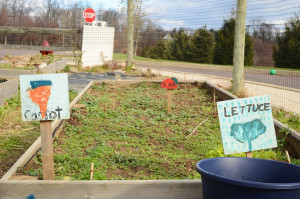Anjali Bose ’20: Just beyond the Newtown Post and the Lower School lays a small garden, planted and taken care of by the EA community. Though busy with school work and athletics, a group of students in the EA Farming Club, led by English teacher John Dilworth, find time to cultivate it and organize its produce.
The club feels that farming the EA garden is important for many different reasons. “I think it’s important that we know where our food comes from, how much time, effort, and work it takes to get a salad or potatoes on your plate. I wanted to bring it to EA because I thought it was something that I learned about and that students could benefit from,” said Dilworth.

Dilworth’s inspiration for starting this project stemmed from his previous work. After college, Dilworth worked on several organic farms in New Zealand that sparked an interest in farming, leading him to create a farm of his own at his house. “I started a farm in my backyard and grew my own food. It’s pretty amazing to see something so tiny like a seed grow into something that you can actually eat, that kind of life cycle. Farming is just something that really grew on me.”
Many Upper, Middle and Lower school students, teachers, and maintenance people spend time taking care of the garden, complete with chickens, ducks, and a hydroponic system, which grows plants in a water based solution that can increase produce up to 30%. “It’s a whole bunch of hands which makes things a lot easier. It’s all hands on deck, and everyone contributes in our own way. We’ve been lucky enough that there have been people who have seen the value and put the funds forward,” explains Dilworth. The seeds they use mostly come from many different donations from various seed companies. “We’ll write to them explaining we’re a school farm and they’ll donate seeds to us usually.” The farm is also funded by the EAPA, which even gave grant money to add a drip irrigation system this year.
The Farming Club has grown a variety of produce. “In the greenhouse, we have a hydroponic system and we grow mostly lettuce in there, uniformly 32 heads of lettuce per cycle.” There are also four different varieties of tomatoes, ranging from cherry to heirloom. There are also “a variety of peppers, eggplant, squash, summer and winter, zucchini, and cucumbers.” Depending on the season, the club, on occasion, also plants potatoes, onions, strawberries, and carrots. “We keep trying to go and diversify a little bit each year. It’s good to rotate and move crops for the beds and it’s good to try out new things each year. We try to have a wide variety of crops to grow. We’re always looking to expand and try new things,” Dilworth says.
When deciding what to grow, they also put what people would like to eat into consideration, as the majority of the food grown is donated to the West Chester Food Cupboard. Dilworth explained, “Almost everything that we grow, we harvest, pack up, and have someone take it over to there. We donated somewhere around, north of 400 pounds of food.”
The next step for the garden would to make a mini orchard of sorts, with several apple, pear, and other fruit trees as well as raspberry and blackberry brambles. “Of course there are certain crops which always perform well, such as garlic, which we keep on planting, but we are always looking to try something else. It’s like a trial and error,” says Dilworth.
Dilworth encourages students to participate in the farming at some point during their time at EA. He explained, “The students have a very comprehensive role. I try to be like a lead farmer, in terms of showing and teaching them, but the students started mostly everything planted this year.” “Students have a huge role,” he summed up. The students have built beds and the hydroponic system, started seed transplanting, and taken care of the ducks and other animals.” Dilworth explained, “It’s about introducing these things and helping them develop an appreciation for it.” James Bagnell ‘18, has been an active participant in the Farming Club for three years now, and encourages student participation. “I joined farming club freshman year, and it allowed me to be outside and with nature- two of my favorite things. It allowed to take a break from school, and to focus on growing, producing, and making friends.”